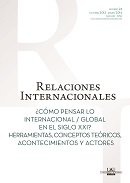Keywords:
International Relations Theory , Analytics of International Relations , Agonism, Genealogy, PoststructuralismCopyright (c) 2013 Thiago RODRIGUES

This work is licensed under a Creative Commons Attribution-NonCommercial-NoDerivatives 4.0 International License.
Abstract
During the 1970’s and early 1980’s Michel Foucault developed a critical approach to the traditional theory of power. His courses and writings have offered a distinctive analytical proposal based on Nietzsche’s genealogy that presented a new possibility to study the power relations without proposing a new global theory. This article aims to review some aspects of Foucault’s analytics of power, his concept of agonism and his genealogical method in order to indicate how they were read in the 1980’s and early 1990’s by authors such as Richard K. Ashley and R.J.B. Walker in order to think the IR field of knowledge as a set of analytical perspectives which avoids and fights ambition of neorealism and neoliberalism to establish universal and comprehensive theoretical frameworks.





